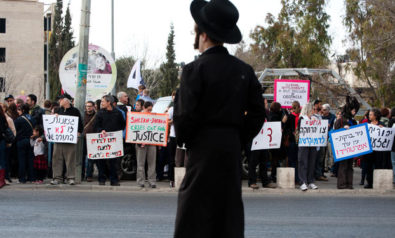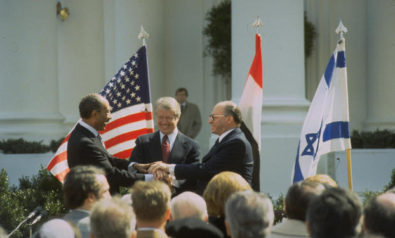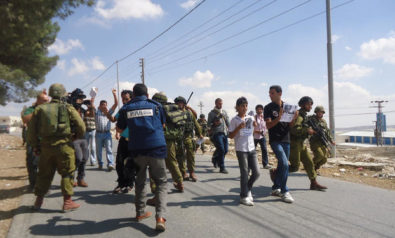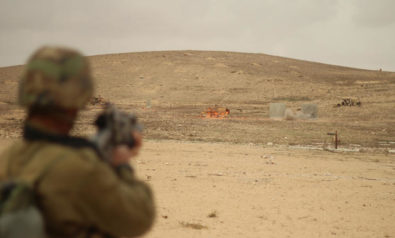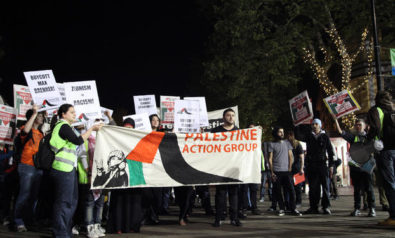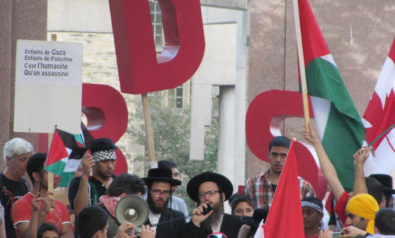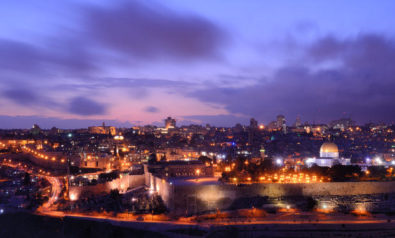A look back at the Israeli-Palestinian conflict and an outline of the occupation, the indefinitely stalled peace-process and the unstable Hamas-Fatah alliance.
Background
The formation of the state of Israel and the subsequent Israeli-Palestinian conflict have remained among the most contentious international developments in the modern world. Since the United Nations Partition Plan of 1947, which granted more than half of previously-owned Palestinian land to the state of Israel, acts of war and terrorism have become a lasting part of this embattled region.
The war of 1948 saw with it the defeat of the surrounding Arab nations including Egypt, Syria, Lebanon, and Jordan and the rise of an American-backed Israel with the capabilities of defending its newly acquired territory and expanding its presence in the Holy Land through settlement-building, expansion, and the expulsion of Palestinians.
Heavy settlement in the occupied territories began in earnest following the swift defeat of Arab forces in the six-day war of June 1967. The Israeli victory was a strong testament to the relationship between the US and Israel as well as a reflection of the buildup of the Israel Defense Force (IDF). The respective Arab nations lost significant pieces of their territory to the Israelis: Egypt lost the Sinai Peninsula, Jordan relinquished the West Bank, and Syria lost the Golan Heights.
The UN Resolution of 1967, which sought to resolve the conflict, further complicated the tense international situation with vague terminology pertaining to the Israeli occupation, settlements, and word usage that defined Palestinians as “refugees” rather than members of the Palestinian nation. Although Egypt regained much of the Sinai Peninsula in the war of 1973, Egypt’s decision to freeze troops at the border and America’s entrance into the struggle prevented further gains on the part of the Arab states.
Notably, the Israelis and Egyptians signed a peace-treaty in 1979, while Jordan also signed an agreement with Israel in 1994.
Meanwhile, frustrations mounted among Palestinians as a by-product of cramped living quarters, resource depletion, the occupation, and unjust treatment from Israeli officials. Anger on the part of the Palestinian people culminated in two major uprisings known as the First Intifada of the late 1980s and the Second Intifada, which took place in the early 2000s. Both uprisings initially comprised of nonviolent civil disobedience but soon culminated in widespread violence from both the Israelis and Palestinians, along with the death of thousands of civilians. The Second Intifada resulted in the Israeli withdrawal from the (now blockaded) Gaza Strip.
These periods also consisted of multiple failed talks among Palestine Liberation Organization (PLO) officials, Israeli leaders, and American presidents, during the Oslo Accords in 1993 and 1995. Yitzhak Rabin, the Israeli PM at the time, was assassinated by a Jewish terrorist in 1995 following right-wing Israeli opposition to the Accords. The former US President Bill Clinton, brought Ehud Barak and Yasser Arafat together in 2000 at the Camp David Summit, however, the negotiations ended at an impasse with both the Israelis and Palestinians blaming each other for the failed talks.
Why is the Israel-Palestine Conflict Relevant?
The most recent years of the conflict have demonstrated the determination of both parties to maintain sovereignty over the territories. The status quo remains strongly in favor of the Israelis despite violent countermeasures by some Palestinian organizations and diplomatic demands for the rights of the Palestinian people.
The most recent war in the blockaded Gaza Strip in 2008 and 2009 caused mass bloodshed among Palestinian civilians as the Israeli military struck Hamas-controlled targets in Gaza as retaliation for rocket fire into Israel. Palestinians have continued to suffer at the hands of the occupation and the settlement building activity in the occupied East Jerusalem and the West Bank.
Given the failure of the PA’s bid for statehood at the UN in 2011, the lack of US presidential support for an independent Palestinian state, and the practical issues that come into play regarding settlement upheaval, land swaps, and military concerns, the Palestinians are unlikely to see their dream of a sovereign state come to fruition.
In addition, the "Palestine Papers", published by Al-Jazeera in 2011, struck at the core of the Palestinian leadership by purporting that the PLO had engaged in secret negotiations with Israeli officials and had given in to Israeli demands at the cost of the Palestinians’ land and rights.
The Palestinian cause continues to suffer as a result of the impasse, intense leadership divisions, and unstable alliances such as the Hamas-Fatah unity agreement. Palestinian pre-conditions such as the freezing of all settlement activity, and Israeli Prime Minister Binyamin Netanyahu’s unwillingness to compromise on land occupied in the six-day war, have put a halt to negotiations for the moment.
For more than 10 years, Fair Observer has been free, fair and independent. No billionaire owns us, no advertisers control us. We are a reader-supported nonprofit. Unlike many other publications, we keep our content free for readers regardless of where they live or whether they can afford to pay. We have no paywalls and no ads.
In the post-truth era of fake news, echo chambers and filter bubbles, we publish a plurality of perspectives from around the world. Anyone can publish with us, but everyone goes through a rigorous editorial process. So, you get fact-checked, well-reasoned content instead of noise.
We publish 2,500+ voices from 90+ countries. We also conduct education and training programs on subjects ranging from digital media and journalism to writing and critical thinking. This doesn’t come cheap. Servers, editors, trainers and web developers cost money.
Please consider supporting us on a regular basis as a recurring donor or a sustaining member.
Support Fair Observer
We rely on your support for our independence, diversity and quality.
Will you support FO’s journalism?
We rely on your support for our independence, diversity and quality.


